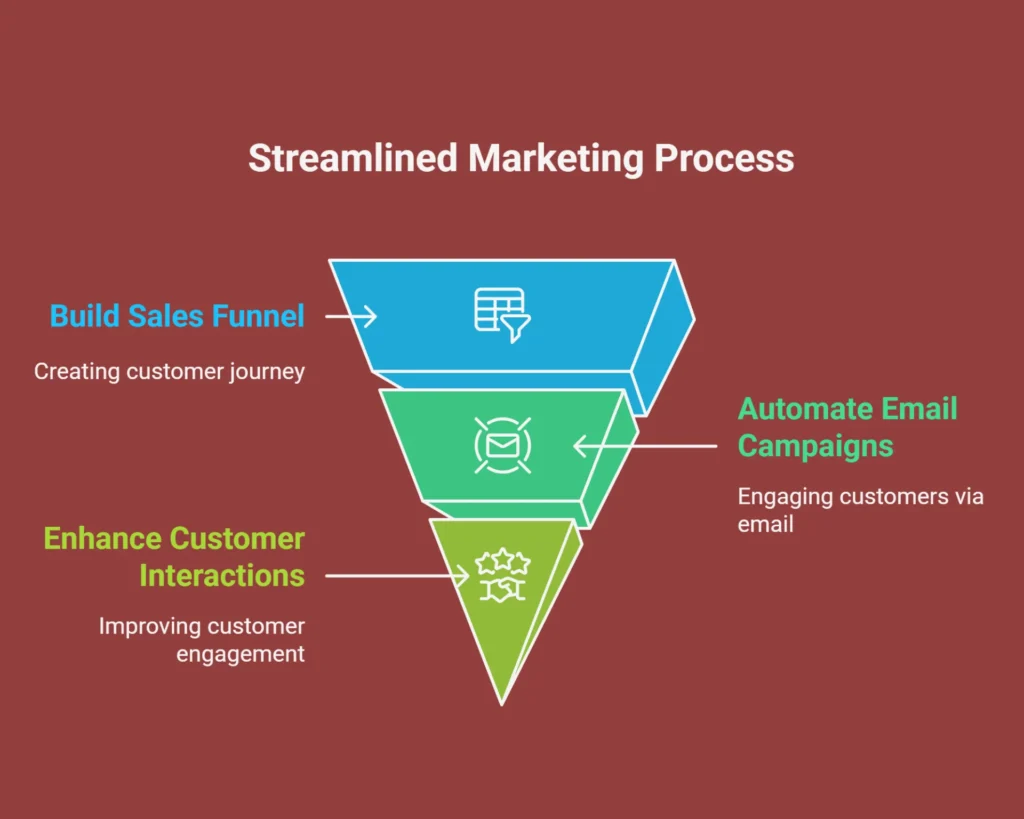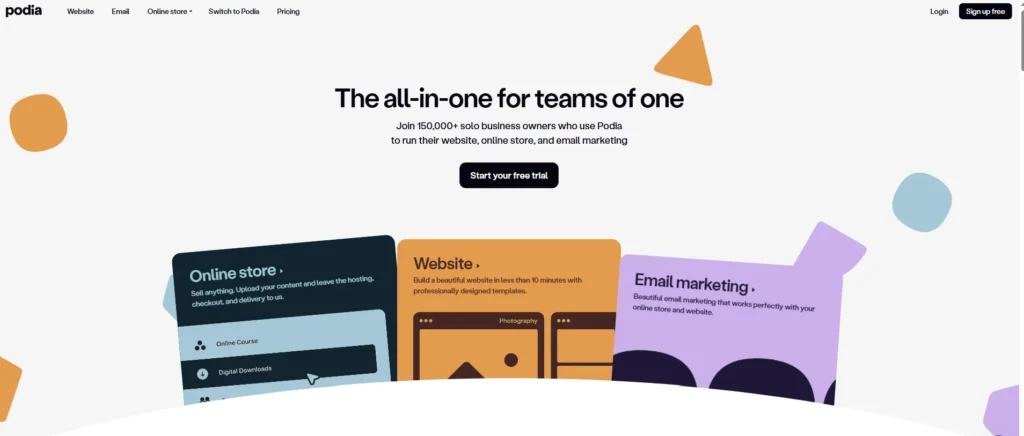Kajabi has earned its place as a leading all-in-one platform for course creators, coaches, and digital entrepreneurs combining online course hosting, email automation, and membership tools under one roof.
But in 2025, creators are looking beyond Kajabi.
They want flexible pricing, better community features, deeper integrations, and control over how they scale.
Whether you’re a beginner or an established brand, there are several Kajabi alternatives that offer similar or even superior capabilities often at lower costs or with free plans.
In this guide, you’ll discover the top Kajabi competitors for every use case, including free and cheap options, feature-rich platforms for automation and LMS, and even open-source tools for total customization.
From Podia and Systeme.io to Kartra and ClickFunnels, we’ll help you find the right platform for your digital business goals.
Table Of Contents
What is Kajabi & Why Are Users Seeking Alternatives?

Kajabi is often positioned as a leading all-in-one platform tailored for digital entrepreneurs, coaches, and course creators who want to build, market, and monetize their knowledge online.
With a blend of features like an integrated online course platform, built-in email marketing automation, membership website capabilities, and a native CRM for creators, Kajabi has made it possible for individuals to launch a digital business without relying on multiple disconnected tools.
The platform has grown significantly within the knowledge commerce space by offering tools that streamline digital product sales, manage online programs, and automate marketing funnels—all under one dashboard.
Its appeal lies in its ability to cater to creators who prioritize speed, ease of use, and a unified backend experience.
However, as the creator economy matures and user expectations evolve, many are reconsidering whether Kajabi still meets their growing needs.
In 2025, a noticeable shift is happening.
Users are increasingly comparing Kajabi to newer platforms with more flexible offerings and exploring a wide range of Kajabi competitors to suit their budgets and business models.
So, why are many creators and educators looking for a Kajabi replacement?
1. High Pricing Tiers
Kajabi’s pricing structure, although justified by its robust features, often starts at a premium.
For solopreneurs or beginners, even the entry-level plans can feel restrictive and costly—especially when compared to platforms offering similar functionality at a fraction of the price or even for free.
2. Limited Design & Customization
Despite its streamlined dashboard, Kajabi lacks the deep customization options that some creators desire.
Design flexibility, advanced coding freedom, or seamless third-party integrations are often limited unless you’re on higher-tier plans.
3. Basic Community Features
As community-driven learning grows in popularity, Kajabi’s built-in tools for engagement—like forums or groups—feel basic compared to what community-first platforms like Mighty Networks or Circle provide.
This evolving landscape has led many creators to seek more affordable, flexible, or specialized solutions—ones that still support digital product sales and course delivery but allow more room to scale, experiment, or engage audiences more effectively.
Key Features to Look For in a Kajabi Alternative

Before you decide to switch platforms, it’s crucial to understand which features actually matter when evaluating Kajabi alternatives.
While Kajabi is well-known for bundling several tools into a single dashboard, not every creator needs—or wants—that exact setup.
In 2025, creators are increasingly choosing platforms that offer more flexibility, transparency, and tools that align with their growth stage.
Below are the core functionalities to consider when reviewing Kajabi competitors.
These features help you build a complete ecosystem for your digital business—from course delivery to customer retention—without being locked into expensive pricing tiers.
1. LMS & Content Dripping Capabilities
A robust learning management system (LMS) is the foundation of any online course platform.
You’ll want an alternative that allows you to organize content into structured modules, set completion rules, and automate the release of lessons through content dripping.
Tools like Thinkific and LearnWorlds stand out here with their detailed curriculum builders and assessment tools.
2. Funnel Builder & Email Marketing Automation

Your platform should support an integrated sales funnel builder and email marketing automation.
This ensures you can capture leads, nurture them through sequences, and convert them without relying on third-party tools.
Platforms like Systeme.io and Kartra excel in combining these tools, making them popular Kajabi replacements for funnel-driven businesses.
3. Sales Tracking & Subscription Billing
Accurate revenue tracking and flexible payment options are essential for growing creators.
Whether you’re offering monthly memberships, one-time courses, or tiered pricing, make sure the alternative offers subscription billing, analytics dashboards, and coupon or affiliate tracking capabilities.
These are key if you plan to scale or experiment with different revenue models.
4. Community Building Tools
Modern digital learning isn’t just about content—it’s about connection.
While Kajabi offers basic engagement tools, many creators now prioritize platforms that foster stronger interaction through built-in community features like groups, chat feeds, and live event capabilities.
Mighty Networks, Circle, and FreshLearn are strong in this area.
5. Video Hosting & Third-Party Integrations
High-quality video hosting is essential if you deliver tutorials, lessons, or coaching via video.
Some Kajabi alternatives come with native hosting, while others integrate seamlessly with Vimeo, YouTube, or Wistia.
Beyond that, look for flexible third-party integrations with CRM platforms, email providers, analytics tools, and webinar software, so you’re not locked into one ecosystem.
When comparing platforms, focus on what directly supports your business model.
Some tools specialize in one area—like community or course creation—while others aim to replicate Kajabi’s all-in-one approach but at a fraction of the cost.
Comparison Table – Quick View of the Best Kajabi Alternatives
If you’re short on time or want a quick snapshot before diving into deeper comparisons, this overview will help you filter the best Kajabi alternatives based on your budget, goals, and business model.
Whether you’re a coach, educator, or digital creator, this table highlights which Kajabi competitors align best with your use case—especially if you’re looking for free plans, affordable pricing, or specific feature sets like course delivery, community building, or sales funnel automation.
Below is a simplified comparison using key criteria such as free plan availability, monthly/yearly pricing, niche fit, and standout features.
| Name | Free Plan | Pricing | Suited For | Key Features |
|---|---|---|---|---|
| Systeme.io | Yes | $0 / $17+ | Funnel builders, coaches, solopreneurs | Sales funnel builder, email automation, course hosting |
| Podia | No | $9 / $90+ | Beginners, digital product sellers | Digital product sales, email marketing, webinars |
| Thinkific | Yes | $0 / $36+ | Educators, structured course creators | Learning management system, content dripping, quizzes |
| Teachable | Yes | $0 / $39+ | Course sellers, freelancers | Subscription billing, course creation tools, tax handling |
| LearnWorlds | No | $24 / $249+ | Academic creators, agencies | Interactive course features, video hosting, SCORM |
| FreshLearn | Yes | $0 / $169+ | New creators, side-hustlers | Course builder, website builder, free domain |
| Kartra | No | $99 / $429+ | Automation-heavy businesses | CRM for creators, all-in-one platform, sales analytics |
| ClickFunnels | No | $97 / $297+ | Funnel marketers, coaches | Landing page builder, funnel templates, A/B testing |
| Mighty Networks | No | $41 / $360+ | Community builders, group coaching | Community tools, events, memberships |
| LearnDash (WordPress) | No | $199/year | WordPress-based course creators | LMS plugin, drip content, quizzes |
| Gumroad | Yes | Free (5–10% fee per sale) | Creators selling ebooks, templates | Digital product sales, simple storefront, analytics |
| Uscreen | No | $149 / $449+ | Video content creators | Video hosting, OTT apps, monetization tools |
| Zenler | Yes (Beta) | $54 / $121+ | Course creators, freelancers | Course + marketing automation, webinar tools |
Top Kajabi Alternatives (Free & Paid – Reviewed)
Choosing the right Kajabi alternative isn’t about finding a one-size-fits-all platform—it’s about aligning the features, pricing, and user experience with your goals as a creator or educator.
Below, we’ve reviewed standout Kajabi competitors that meet different needs, from funnel building and email marketing automation to advanced course delivery systems and digital product sales.
Each of these platforms offers something Kajabi doesn’t—be it a generous free plan, greater flexibility, or stronger tools tailored to specific types of creators.
1. Systeme.io – Best Free Kajabi Alternative for Funnels

Systeme.io is quickly gaining ground as a powerful Kajabi alternative free platform designed for those who prioritize marketing automation.
Built for solopreneurs, coaches, and small course creators, it combines a sales funnel builder, email list management tools, and course creation features—all under one dashboard, with no upfront cost.
Key Features:
- Visual funnel builder with templates
- Built-in email automation and tagging
- Blogging and landing pages
- Course hosting with drip content
- Affiliate program management
Pros:
- Forever free Plan available
- All-in-one features with no add-ons required
- Intuitive interface ideal for beginners
Cons:
- Design customization is somewhat limited.
- Fewer advanced analytics tools than paid alternatives
Pricing:
- Free Plan: Yes
- Starter: $17/month
- Webinar: $47/month
- Unlimited: $97/month
Best For:
Budget-conscious creators are looking for an all-in-one platform to launch courses, funnels, and automated campaigns without paying a premium.
2. Podia – Best Cheap Kajabi Replacement for Digital Creators

If your primary focus is selling digital products, running simple online courses, or building a newsletter-driven business, Podia is one of the most user-friendly and cheap Kajabi alternatives available in 2025.
Designed with the creator economy in mind, Podia provides all the tools needed to build your storefront, deliver your content, and engage your audience without transaction fees or steep learning curves.
Key Features:
- Sell courses, webinars, downloads, coaching
- In-house email marketing tools
- Clean interface and fast setup
- No transaction fees
- Custom domain and checkout pages
Pros:
- Great UI and easy for beginners
- Built-in email tools and upsells
- Affordable starter plan
Cons:
- Limited automation and funnel features
- Customization options are basic
Pricing:
- Starter Plan: $9/month
- Mover Plan: $33/month
- Shaker Plan: $75/month
Best For:
New creators, digital sellers, and those seeking a low-cost platform that combines essential selling tools without overwhelming features.
3. Thinkific – Best LMS-Focused Kajabi Alternative

Thinkific stands out for its robust learning management system (LMS) and is ideal for educators, course creators, and training companies that require structured content delivery, assessments, and student analytics.
As a Kajabi replacement focused purely on teaching infrastructure, it’s hard to beat in terms of usability and scalability.
Key Features:
- Drag-and-drop course builder
- Content dripping, quizzes, and certificates
- Student tracking and detailed analytics
- Custom domains and integrations
- No transaction fees on any plan
Pros:
- High-quality LMS capabilities
- Excellent course structure and learner tools
- Generous free Plan
Cons:
- Funnel and email tools are limited.
- Design options can feel templated.
Pricing:
- Basic: $36/month
- Start: $74/month
- Grow: $149/month
Best For:
Instructors and course developers who need a full-featured course delivery system with an emphasis on learning outcomes and student management.
4. Teachable – Best for Custom Course Monetization

Teachable stands out among Kajabi competitors for creators who prioritize revenue flexibility and a clean, streamlined teaching interface.
What makes it an excellent Kajabi replacement is its strong focus on course creation tools paired with powerful subscription billing options, allowing creators to sell courses, coaching sessions, or bundles using one-time payments, recurring models, or even pay-what-you-want pricing.
Key Features:
- Custom pricing models (subscriptions, one-time, bundles)
- Tax compliance, EU VAT management, and payment handling
- Simple drag-and-drop course builder
- Mobile-responsive learning environment
- Affiliate marketing capabilities and student management
Pros:
- Great for multi-course pricing and monetization models
- Handles tax compliance globally
- Integrated checkout, sales tracking, and affiliate management
Cons:
- Limited email marketing and automation tools
- Template design options are restricted unless upgraded.
Pricing:
- Free Plan: Yes (with $1 + 10% per transaction)
- Basic: $39/month
- Pro: $119/month
- Business: $199/month
Best For:
Course creators who want full control over monetization need subscription billing and want to simplify their sales process without giving up global tax support.
5. LearnWorlds – Best for Interactive Course Features

If your online learning experience relies heavily on student engagement and advanced multimedia, LearnWorlds is a compelling Kajabi alternative with an emphasis on interactive learning platform features.
It supports in-course quizzes, assessments, SCORM compliance, video engagement tools, and advanced analytics—ideal for professional educators, corporate trainers, or creators offering high-touch programs.
Key Features:
- SCORM and xAPI support for standardized learning content
- Interactive video tools with quizzes, transcripts, and syncing
- Pop-ups and in-course engagement prompts
- Custom-branded mobile app option
- Extensive reporting dashboard
Pros:
- Robust interaction capabilities for better learner retention
- Advanced analytics and compliance with e-learning standards
- Beautiful course layouts and learning pathways
Cons:
- Slight learning curve compared to simpler tools
- No forever-free plan (only a 30-day trial)
Pricing:
- Starter: $24/month
- Pro Trainer: $99/month
- Learning Center: $249/month
Best For:
Educators and businesses who value detailed engagement tools, interactive content formats, and multimedia-rich course experiences.
6. FreshLearn – Great Lightweight Kajabi Alternative for Beginners

FreshLearn is designed as a simplified Kajabi alternative free solution for new creators and solopreneurs looking to launch quickly.
It’s built with the no-code creator in mind, offering easy setup, a user-friendly interface, and onboarding templates that guide you through launching your first course or coaching program without friction.
Key Features:
- Drag-and-drop builder for courses and landing pages
- Pre-made templates and onboarding wizards
- Free SSL, custom domains, and white-label options
- Course certificates and drip content
- Built-in checkout and email tool
Pros:
- No coding or tech experience is needed.
- Offers a solid free plan for early-stage creators
- Fast to launch and easy to scale
Cons:
- Limited advanced customization
- Basic analytics compared to larger platforms.
Pricing:
- Free Plan: Yes
- Pro Plan: $37/month
- No Brainer Plan: $59/month
- No Brainer+: $119/month
- Enterprise: $169/month
Best For:
Beginners, small educators, and no-code creators who want an affordable and straightforward launchpad with all the essentials included.
7. Kartra – Best Automation-Focused Kajabi Competitor

Kartra stands out as a feature-rich Kajabi competitor tailored for creators and businesses that prioritize deep automation and customer lifecycle management.
Unlike basic platforms, Kartra offers a full automation suite that integrates email workflows, sales funnels, and a CRM for creators—making it a powerhouse for scaling digital products or coaching services with precision.
Key Features:
- Advanced visual funnel and email workflow builder
- Integrated CRM with tagging and lead scoring
- Built-in checkout system and affiliate tracking
- Helpdesk and calendar scheduling tools
- Membership portal with content protection
Pros:
- Powerful automation tools without third-party apps
- Unified dashboard for marketing, sales, and support
- Ideal for evergreen funnels and complex journeys
Cons:
- Higher learning curve for non-technical users
- No free plan is available.
Pricing:
- Starter Plan: $99/month
- Gold Plan: $189/month
- Platinum Plan: $429/month
Best For:
Experienced marketers and educators seeking a CRM-integrated all-in-one platform with robust automation and scalable business infrastructure.
8. ClickFunnels – Best Funnel-First Replacement

For creators who focus primarily on marketing funnels, ClickFunnels remains one of the most popular alternatives to Kajabi.
It’s specifically designed for lead generation, conversion, and upsell optimization through its powerful funnel builder and ready-to-use landing page software.
ClickFunnels doesn’t aim to be a complete LMS but rather excels in turning cold traffic into buyers, making it a strong Kajabi alternative for users whose core need is conversion-driven campaigns.
Key Features:
- Drag-and-drop funnel builder with pre-made templates
- Webinar funnels and automated follow-up sequences
- Sales pages, checkout forms, and upsell flows
- Membership site capabilities
- Third-party email and CRM integrations
Pros:
- Fast funnel creation with minimal setup
- Extensive library of pre-built templates
- Designed for sales optimization and high conversion
Cons:
- It is not ideal for structured course delivery.
- Email marketing tools are only available in higher plans.
Pricing:
- Startup: $97/month
- Pro: $297/month
Best For:
Coaches, consultants, and online sellers focused on conversion-focused sales funnels, webinars, and landing page creation.
9. Mighty Networks – Best for Community + Courses

Suppose you’re looking to build a thriving audience through community-first learning.
In that case, Mighty Networks is a standout Kajabi alternative that combines membership tools and community builder features into one streamlined platform.
It shifts the focus from passive content consumption to engagement, offering creators the ability to manage discussions, courses, and events under one branded experience.
Key Features:
- Member feed, discussions, live events, and polls
- Integrated course builder with flexible pricing
- Mobile app access and branded community
- Built-in payment processing
- Public or private access options
Pros:
- Strong community-building capabilities
- Highly interactive and engagement-friendly
- Ideal for cohort-based or ongoing coaching models
Cons:
- Less robust automation and funnel tools
- Basic email features compared to full-stack platforms
Pricing:
- Community Plan: $41/month
- The Courses Plan: $99/month
- The Business Plan: $179/month
- The Path-to-Pro Plan: $360/month
Best For:
Educators and creators who want to build a community-centric learning experience, blending content delivery with discussions and live engagement.
10. Gumroad – Best for Selling Digital Downloads with Ease

Gumroad is a lightweight, creator-friendly platform that excels in digital product sales.
It is one of the most straightforward Kajabi alternatives for selling ebooks, templates, music, art, or any downloadable product.
Its minimal setup and pay-as-you-earn model appeal to creators who don’t need complex funnels or course infrastructure but want to launch and sell fast.
Key Features:
- Quick product uploads (PDFs, ZIPs, videos, audio)
- Custom pricing, discount codes, and license key support
- Global payment processing with payout flexibility
- Embeddable buy buttons and sales pages
- Analytics and buyer insights dashboard
Pros:
- Zero monthly fee option for new creators
- Instant product delivery after purchase
- Ideal for the knowledge commerce economy
Cons:
- Limited branding and design control
- Not suited for structured online courses
Pricing:
- Free to start (10% + processing fee)
- Optional lower fee with monthly plans for high-volume sellers
Best For:
Creators looking to focus on digital downloads without managing an LMS or full sales funnel, especially those monetizing templates, guides, or digital art.
11. LearnDash – Best WordPress-Based Kajabi Alternative

If you prefer to build your platform within your website, LearnDash is a leading WordPress LMS plugin that turns any WordPress site into a powerful course delivery system.
It’s a trusted choice among educators, universities, and independent course creators who need advanced learning features with total control over design and hosting.
Key Features:
- Advanced quizzes, assignments, and certificates
- Content dripping and prerequisite enforcement.
- Drag-and-drop course builder with WooCommerce integration
- Supports groups, forums, and membership plugins
- Customizable with WordPress themes and plugins
Pros:
- Full ownership of your platform and data
- Scalability with plugins and extensions
- Ideal for long-term brand-building
Cons:
- Requires WordPress knowledge and hosting setup
- Support depends on the WordPress environment.
Pricing:
- 1 site license: $199/year
- 10 sites: $399/year
- Unlimited: $799/year
Best For:
Course creators comfortable with WordPress who want complete flexibility and own their learning platform without relying on SaaS tools.
12. Uscreen – Video Memberships + OTT App Delivery

Uscreen is a high-performance Kajabi alternative built for video-first businesses, including fitness coaches, streamers, educators, and creators who offer memberships or video-on-demand.
It provides a comprehensive video course platform that enables users to monetize through subscriptions, rentals, or pay-per-view and even launch branded OTT apps.
Key Features:
- Video hosting with DRM protection and mobile optimization
- Recurring billing for membership or content access
- Live streaming, community chats, and content schedules
- Branded OTT apps (Apple TV, Roku, Android TV)
- Built-in analytics and retention tools
Pros:
- Designed for video monetization from the ground up
- Supports branded mobile and TV apps
- Excellent for hybrid live + on-demand content
Cons:
- No free plan or entry-level pricing
- Not suitable for non-video content creators
Pricing:
- Growth Plan: $149/month
- App Essentials plan: $449/month
Best For:
Creators whose businesses revolve around video content and require seamless delivery, OTT monetization, and mobile-first learning experiences.
13. Skillshare – Marketplace-Based Kajabi Alternative

Skillshare presents a different model from traditional course platforms.
As a course hosting software with a built-in student base, it allows creators to publish educational content and earn through a passive income model tied to watch time and royalty pools.
Unlike Kajabi, where creators manage their audience acquisition, Skillshare offers access to a marketplace already populated with active learners.
This makes it a practical Kajabi alternative for instructors who prefer focusing on content creation while letting the platform handle visibility and discovery.
Key Features:
- Host video-based classes in creative, business, or lifestyle niches
- Get paid via royalties based on class engagement.
- Access to an internal student base
- Built-in review and rating system
- Simple publishing and class formatting process
Pros:
- No need to build your website or email list
- Discoverability within a large learning platform
- Reliable royalty-based monetization
Cons:
- Limited control over branding and pricing
- Revenue depends heavily on platform traffic and watch time.
Pricing (for learners):
- Creators can join for free; Skillshare handles payouts based on performance metrics.
Best For:
Teachers and creatives who want to generate passive income by tapping into a marketplace rather than building a custom site or audience from scratch.
14. Zenler – New All-in-One Kajabi Competitor

Zenler is rapidly emerging as a modern all-in-one platform and Kajabi replacement that integrates LMS tools, sales funnel builders, marketing automation, webinars, and email—all under one roof.
It’s currently in beta but has already attracted course creators due to its affordability and full-stack capabilities.
For creators who want to avoid stitching together multiple tools and still need the essentials Kajabi provides, Zenler offers a simplified solution without enterprise-level pricing.
Key Features:
- Drag-and-drop course builder with quizzes and drip content
- Built-in email marketing, automation, and tagging
- Funnel builder for lead magnets, opt-ins, and upsells
- Webinar hosting (live and automated)
- Payment gateway integration with checkout pages
Pros:
- Affordable pricing compared to Kajabi
- Centralized dashboard for marketing, courses, and automation
- Great for creators who want to grow without switching platforms later
Cons:
- It is still in beta; some advanced features are under development.
- Fewer third-party integrations compared to more mature tools
Pricing:
- Pro Plan: $54/month (billed annually)
- Premium Plan: $121/month
Best For:
Course creators and coaches are looking for a full-featured sales funnel builder and LMS that’s simpler and more affordable than Kajabi.
Cheapest Kajabi Alternatives for Beginners (Under $30/Month)
If you’re a new creator or coach looking to launch your first digital product or online course, jumping straight into Kajabi’s premium pricing structure can feel overwhelming.
Fortunately, several cheap Kajabi alternatives offer essential features—like course hosting, email marketing, and basic automation—at a fraction of the cost.
Some even come with generous free plans, making them perfect for beginners who want to start lean without sacrificing functionality.
Below are three of the most accessible and beginner-friendly Kajabi alternatives in 2025 that fall under the $30/month mark, including Kajabi alternative free options.
Systeme.io – Free Kajabi Alternative with Funnel & Email Tools
Systeme.io is arguably the most complete Kajabi replacement available for free.
It provides a full suite of tools for funnel building, course creation, email automation, and product sales—all from a single dashboard.
For early-stage creators, it offers everything needed to get started without any financial commitment.
- Free Plan: Yes
- Starter Plan: $17/month
- Best For: Solopreneurs and funnel-based digital businesses
- Key Features: Visual funnel builder, unlimited emails, course hosting, affiliate program management
FreshLearn – Lightweight & Beginner-Friendly Free Plan
FreshLearn targets the no-code creator community with a simplified experience that focuses on ease of use and fast setup.
It offers a free plan with essential tools and is ideal for creators who want a clean, user-friendly environment to host courses, set up payment pages, and launch coaching programs.
- Free Plan: Yes
- Pro Plan: $37/month (but often discounted)
- Best For: Beginners, educators, no-code creators
- Key Features: Course builder, website templates, custom domains, digital certificates
Podia – Low-Cost Kajabi Alternative for Digital Sellers
Podia remains one of the top low-cost Kajabi alternatives, with a starter plan priced at just $9/month.
While limited in some advanced features, it allows new creators to sell digital downloads, courses, and coaching sessions without the need for technical experience.
- Free Plan: No
- Starter Plan: $9/month
- Best For: Creators selling ebooks, templates, and simple courses
- Key Features: Product storefront, email marketing, course hosting, upsells
These platforms enable new creators to test, launch, and validate their ideas with minimal upfront investment.
Whether you’re building a funnel, creating a mini-course, or selling a downloadable product, these Kajabi competitors give you the flexibility to grow without locking you into high monthly fees.
Kajabi Open Source & WordPress Alternatives
While platforms like Kajabi cater to users seeking an all-in-one hosted solution, not every creator prefers the closed ecosystem or monthly recurring fees.
Some want full control over customization, data, and hosting.
That’s where Kajabi open-source alternatives and WordPress-based platforms come in.
These tools offer more flexibility and are ideal for advanced users, developers, or educators who want to own their infrastructure.
From LMS plugins for WordPress to completely open-source learning platforms, these options serve as powerful, scalable Kajabi competitors—especially for those prioritizing long-term cost control or granular course structure.
1. LearnDash + WordPress – Full Control with Professional LMS Capabilities
LearnDash is a widely respected WordPress-based platform that turns your site into a fully functional learning management system (LMS).
When paired with the power of WordPress, it offers unmatched control over your brand, data, and learning environment.
From lesson drip schedules to advanced quizzes and assignments, LearnDash serves as a robust Kajabi replacement for course creators who value flexibility.
- Seamless integration with WooCommerce, BuddyPress, and membership plugins
- Supports certificates, course prerequisites, quizzes, and group management
- Highly customizable through WordPress themes and builders
- One-time yearly pricing instead of monthly subscriptions
TutorLMS – Affordable WordPress LMS with Easy Setup

TutorLMS is another powerful WordPress plugin that offers an intuitive, budget-friendly way to build online courses with strong frontend and backend experiences.
It’s built for educators and entrepreneurs who want a visual course builder, quiz system, and monetization flexibility—all while retaining full ownership of their site.
- Drag-and-drop builder for course structure
- Advanced quiz creator, content drip, and student dashboard
- Works with Elementor and Gutenberg for design customization
- Free version available with essential LMS features
Moodle & Canvas – Enterprise-Grade Open Source LMS
For creators who prefer complete autonomy or operate within academic institutions, Moodle and Canvas LMS are two of the most powerful open-source LMS options available.
These platforms are not tied to any proprietary ecosystem and allow total customization, from course layouts to data structures, integrations, and analytics.
- Self-hosted with extensive scalability options
- SCORM and xAPI support for enterprise-grade e-learning
- Community-driven with frequent updates and plugins
- Requires a hosting environment and technical setup
These tools are ideal for advanced course creators, universities, or developers who want to build something entirely custom, beyond the limitations of traditional SaaS platforms.
Kajabi vs Other Platforms – Feature-by-Feature Comparison Table

Choosing the right platform can be overwhelming when every tool promises to be an all-in-one solution.
Kajabi does offer a strong suite of features, but it’s not always the best fit for every creator—especially those with specific needs around pricing, automation, or community building.
To help you decide, this feature-by-feature comparison table breaks down how Kajabi stacks up against four top Kajabi alternatives: Teachable, Podia, Systeme.io, and Kartra.
This table evaluates essential components of any online course business, including course hosting, email marketing, sales funnel tools, community features, and pricing.
All five platforms are positioned for the creator economy, but each takes a different approach to building and scaling a digital business.
| Platform | LMS | Funnels | Email Marketing | Community | Starting Price |
|---|---|---|---|---|---|
| Kajabi | Full LMS with quizzes, drip, & assessments | Built-in funnel builder | Native email sequences + automation | Basic group/community tools | $71/month |
| Teachable | Robust course hosting with certificates | Limited (requires Zapier or 3rd party) | Basic email features (no automation) | No native community tools | $0 (limited), $39/mo |
| Podia | Simple LMS for digital courses & downloads | Yes (basic funneling features) | In-house email marketing with upsells | Limited (no group discussion tools) | $9/month |
| Systeme.io | Course hosting with quizzes & drip content | Visual funnel builder with templates | Unlimited email automation & tagging | No community tools built-in | $0 (free forever) |
| Kartra | Full-featured LMS + video hosting | Advanced sales page builder | High-level automation + behavioral rules | No community feature (can integrate) | $99/month |
Insights:
- Kajabi offers the most balanced “all-in-one” experience but at a premium price.
- Systeme.io is the best Kajabi alternative. It is a free option with impressive funnel and email capabilities.
- Kartra wins in automation and CRM integration but lacks a native community or LMS depth like Kajabi.
- Teachable is great for course delivery but relies on integrations for funneling or advanced email workflows.
- Podia is a cheap Kajabi alternative that’s perfect for beginners needing basic features without extra complexity.
How to Choose the Right Kajabi Alternative (Final Checklist)
With so many Kajabi alternatives available in 2025—each tailored for different needs and budgets—the best choice ultimately comes down to understanding your priorities.
Whether you’re an educator launching a course for the first time or a seasoned creator scaling your digital business, it’s important to evaluate each platform based on your unique situation rather than simply chasing feature checklists.
This final checklist will help you align your decision with what actually matters to your business.
Consider the following five factors before selecting the right Kajabi replacement.
1. Budget
If cost is a concern, focus on platforms that offer a generous free plan or entry-level pricing under $30/month.
Tools like Systeme.io and FreshLearn deliver solid value without upfront investment.
2. Technical Skills
Do you prefer drag-and-drop builders, or don’t you mind working with plugins and settings?
- If you’re non-technical, choose user-friendly all-in-one platforms like Podia or Teachable.
- For tech-savvy users or developers, WordPress-based platforms like LearnDash or TutorLMS offer deeper customization.
3. Marketing & Automation Tools
Your platform should support how you plan to grow and monetize. Ask yourself:
- Do you need sales funnels, email automation, or lead tracking?
- Is an integrated CRM for creators important to you?
If yes, look into tools like Kartra or Systeme.io, which offer full automation capabilities without relying on third-party software.
4. Community Features
Building an audience or facilitating student interaction?
If community engagement is a key part of your strategy, platforms like Mighty Networks or Circle are better suited than tools that only offer static course hosting.
5. Scalability
Can the platform grow with your business?
Some Kajabi competitors start cheap but lack the features needed at scale.
Others, like Zenler or Kartra, are built to evolve with your brand as you grow into more complex funnels, course delivery systems, or multi-product businesses.
Making the right decision isn’t just about ticking feature boxes.
It’s about choosing a platform that meets your current needs while still leaving room to grow.
Revisit your priorities, weigh them against what each tool offers, and test free trials when available.
The right Kajabi alternative is the one that empowers you to focus more on your content and audience—and less on workarounds and limitations.
Migrating Away from Kajabi: What You Need to Know
Whether you’re switching to a cheaper Kajabi alternative, looking for more customization, or simply outgrowing the platform, transitioning from Kajabi to another tool requires careful planning.
While Kajabi is known for its convenience, moving to a different course platform with better flexibility, pricing, or scalability involves multiple components—like content, contacts, and domain setup.
Understanding how to handle platform migration properly will help you avoid downtime, retain your audience, and rebuild key workflows like funnels and automation with minimal disruption.
Exporting Courses and Content
The first step in migrating away from Kajabi is to export your course materials.
While Kajabi doesn’t offer a one-click export for entire courses, you can manually download:
- Video lessons and file uploads
- Written content and lesson structure
- Course thumbnails, images, and checklists
Once exported, upload them to your new content hosting platform, such as Thinkific, Systeme.io, or LearnWorlds, all of which offer structured course creation tools, drip functionality, and assessments.
Email List Migration
Your email list is one of your most valuable assets, and migrating it properly is essential to maintaining relationships and future revenue.
In Kajabi, export your email contacts (with tags, if possible) as a CSV file.
Then import them into your new provider:
- For automation-driven funnels, tools like Systeme.io or Kartra work well.
- For course-specific engagement, ConvertKit or MailerLite integrates easily with most LMS platforms.
If your Kajabi workflows are complex, you may need to rebuild automation manually.
Some Kajabi competitors provide migration support or automation blueprints to help replicate your sequences.
Domain Redirection and SEO Considerations
If you used Kajabi to host your main website or sales funnels, you’ll need to set up domain redirection so users (and search engines) are routed to your new site.
Steps include:
- Redirecting your custom domain to your new platform (via DNS)
- Setting up 301 redirects for core sales pages and blog posts
- Verifying domain ownership with tools like Google Search Console
- Updating any branded links shared across social media or email
Many Kajabi alternatives, such as Podia, Teachable, and WordPress LMS solutions, support custom domains and built-in SEO tools to help maintain authority.
Final Verdict
With so many Kajabi alternatives available in 2025, choosing the right platform is less about which one is “best” and more about which one fits your current goals, budget, and technical comfort level.
Here’s a final summary to guide your decision:
| Use Case | Best Kajabi Alternative |
|---|---|
| Budget-friendly | Podia, Systeme.io |
| Funnel-focused | Kartra, ClickFunnels |
| Community-led learning | Mighty Networks, Circle |
| Open-source flexibility | LearnDash, TutorLMS |
| All-in-one experience | Zenler, Teachable |
Whether you’re scaling an online course business or launching your first product, there’s a Kajabi competitors that offers the right balance of tools, pricing, and usability.
Still undecided? Explore free trials where available, and compare how each platform supports email automation, course creation, and community growth based on your strategy.
FAQs – Kajabi Alternatives (2025 Update)
What is the best Kajabi alternative?
The best Kajabi alternative depends on your business goals.
For funnel-based automation and CRM, Kartra is an excellent option.
If you prefer a budget-friendly platform, Systeme.io offers an all-in-one suite with a forever-free plan. For a course-focused alternative, Thinkific or Teachable are solid choices.
Which is better, Kajabi or ClickFunnels?
Kajabi is better for creators who are focused on course delivery and membership sites.
ClickFunnels, however, is built primarily as a sales funnel builder and is ideal for businesses that want high-converting landing pages, upsells, and webinars.
Kajabi includes basic funnel tools, but ClickFunnels offers more advanced funnel customization.
Is Kajabi SEO friendly?
Kajabi includes basic SEO features like custom meta tags, URL slugs, and blog functionality.
However, it lacks the flexibility and plugin ecosystem offered by WordPress-based platforms like LearnDash, which can provide advanced SEO tools and schema integration for better search visibility.
Are there any free Kajabi alternatives for beginners?
Yes, Systeme.io and FreshLearn are two highly rated free Kajabi alternatives.
Both platforms allow you to launch courses, manage emails, and create funnels at no cost, making them ideal for new creators starting with limited budgets.
Podia’s Starter Plan begins at just $9/month, making it one of the most affordable Kajabi competitors.
It supports digital downloads, courses, and in-house email tools, offering good value without the complexity of an enterprise system.
Which platform is best for building a community?
For community-centric businesses, Mighty Networks excels with native features like group discussions, live events, and member feeds.
It’s a strong Kajabi alternative for creators whose primary focus is engagement, not just content delivery.
How does Podia compare to Kajabi?
Podia is a simpler, more affordable platform focused on creators selling digital products, mini-courses, and coaching.
While Kajabi includes more marketing automation and advanced course tools, Podia is easier to set up and doesn’t charge transaction fees.
What is Kajabi competition?
Kajabi’s main competitors include platforms like Systeme.io, Teachable, Thinkific, Podia, and Kartra.
These tools offer varying combinations of email marketing, content hosting, CRM features, and subscription billing, often at more flexible or lower pricing tiers.
Which Kajabi alternative offers the best value for small creators?
Systeme.io and Podia both offer great value for solopreneurs and small teams.
Systeme.io includes email automation, funnels, and course hosting on a free plan, while Podia provides an easy-to-use platform for digital product sales and coaching with low entry pricing.
Also Read:
- Passion.io vs. Kajabi: Which Platform is Best for You in 2025?
- Kajabi vs Clickfunnels (2025): Which All-in-One Platform Is Right for You?
- 9 Best Affordable Bluehost Alternatives That Saves Your Money
- Canva Alternatives 2025 – Better and Cheaper Than Canva at Zero Monthly Fee?



